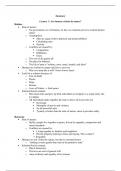Summary
Lecture 1: Are humans violent by nature?
Hobbes
State of nature:
o No government, no civilization, no law, no common power to restrain human
nature
o Assumptions:
Men are equal, both in physical and mental abilities
Calculating men
Scarcity
o Conflicts are caused by:
Competition
Diffidence
Glory
o The war of all against all
o No place for industry
o The life of man is “solitary, poor, nasty, brutish, and short”
Humans are violent by nature (and try to survive)
o Man is to man like a wolf ‘homo homini lupus’
Look for a solution because of:
o Fear of death
o Desire
o Hope
o Reason
o Laws of Nature → Seek peace
Solution/Social contract:
o Men must unite and give up their individual sovereignty to a single unity, the
Leviathan
o All individuals make together the state is above all to prevent war
Sovereign
Monopoly of power and violence
An all powerful state
Tyranny is better than the state of nature, since it provides safety
Rousseau
State of nature:
o Idyllic, people live together in peace, driven by empathy, compassion and
moral standards
o Conflicts are caused by:
Living together as families and neighbors
Private property (placing a fence and saying “this is mine”)
→ Inequality
Humans are not violent by nature, but due to external factors
o “nothing is more gentle than man in his primitive state”
Solution/Social contract:
o Direct democracy
o The laws are acts of general will
o Aims at liberty and equality of its citizens
, Giving up natural liberty, but getting political liberty in return
Pinker
Inspired by Hobbes
Humans are not violent by nature
o Agrees with Hobbes that humans used to be violent
o But we are improving, thanks to civilization, especially the Enlightenment →
A strong decline of violence
o The use of violence is rather an exception than rule in civilized society
o Optimistic view of the future
Five Inner Demons = Triggers of violence
o Instrumental violence = People use violence to achieve something, it serves a
purpose
o Dominance = To show that you are better than others, to settle the power
relations
o Revenge = To let the other pay (retribution, justice, punishment)
o Sadism = Enjoy letting others suffer
o Ideology = Believes it serves a good cause (justification)
Four Better Angels = Motives for peace
o Empathy = Feel what others are feeling
o Self-control = Act of the will, will-power (different from reason)
o Morality
o Reason
Five (favorable) historical forces:
o States/Leviathan (Hobbes)
o Commerce = When there is trade, there cannot be war
o Feminization = Increasing respect for women
o Cosmopolitanism = Mobility, literacy and media allow people to take on new
perspectives and expand circles of empathy
o Knowledge/rationality/education = Able to reframe violence as a problem to be
solved instead of a contest to be won
De Waal
Inspired by Rousseau
Humans are not violent by nature, but empathic by nature and share this quality with
other primates
Against the Veneer Theory:
o We can build a wall/veneer, cover the “bad” human nature and constrain the
violent human nature
o When this cover breaks down (due to i.e. war), this is exposed again
Instead: Russian Doll Model
o Based on observational research of ‘higher primates’, i.e. chimpanzees and
bonobo’s, who express empathy
o Increasing levels of mutual understanding with the emergence of
consciousness:
Feeling with the other (emotional contagion)
Understanding what the other feels (cognitive empathy)
Fully placing yourself in the shoes of the other (attribution)
o Each earlier layer plays a role in the higher layers
, o Humans are able to connect at a deeper level, the other is not just an enemy
Lecture 2: Social/political/economic explanations of violence - Why do humans use
violence?
Hegel
Social explanation for the use of violence
o What happens between humans when they are conscious of each other?
Hegel’s dialectic = Development of history
o Thesis = Argument
o Antithesis = Counterargument
o Synthesis = New argument
In this history: (Human) consciousness emerges
An extra dimension: ‘Spirit’ (‘Geist’)
o Consciousness meets other consciousnesses
o Humans are aware of how other people see them, and therefore see themselves
through the eyes of the other
o Makes you fully ‘interdependent’ = You cannot see yourself as an individual
since you care about what others think of you
Recognition = Humans want to be recognized by others, acknowledged for their
worth, respected
Source of conflict:
o Both individuals struggle for recognition
o If there is no equality then this results in affirmation of one self-consciousness
at the cost of the negation or annihilation of the other
o Hierarchy (masters vs. slaves; lordship & bondage)
o Never satisfactory → Conflicts
Solution/Freedom:
o Rather than seeing conflict as negative, Hegel believes it is necessary for
individuals to achieve a better understanding of themselves and move to a
higher state
o When you no longer worry about this (equal recognition), your consciousness
returns to yourself and you are ‘free’
o You can relate to each other as equals / equal subjects
In modern times, we start to understand that equality is essential
o Rule of law, democracy → This makes us free, free subjects among other free
subjects, the end of oppression → ‘End of history’
Marx
Historical path towards inequality:
o There has always been an arrangement of society into various orders/classes
o Once people started producing more than they needed (materialism), an
unequal society arose (have’s and have-not’s)
o Modern bourgeois society has established new opposing classes, new
conditions of oppression, new forms of struggle in place of the old ones BUT
simplified:
Bourgeoisie = The ruling class
Proletariat = The working class
o Capitalism leads to the bourgeoisie exploiting the proletariat and profiting
from their labor which leads to economic inequality




